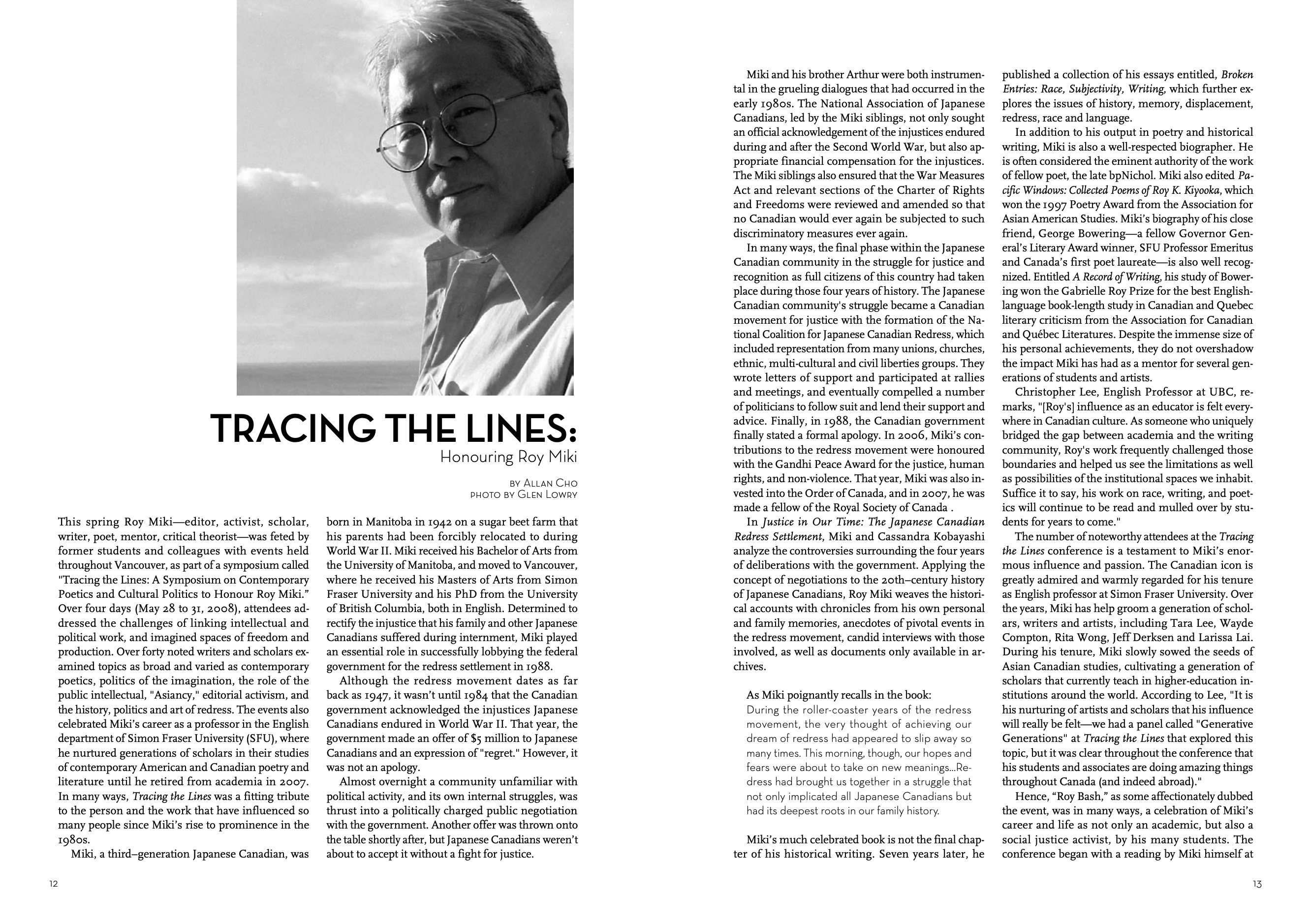
“Tracing the Lines: Honouring Roy Miki” by Allan Cho
Ricepaper Magazine mourns the loss of Roy Miki, whose passing marks the end of an era in Canadian literature and social justice. As a poet, scholar, and lifelong activist, Roy’s contributions to Canada’s cultural and political landscape were as profound and resonant as his written words. His work not only chronicled the struggles of Japanese Canadians but also fought for their recognition and dignity. With heavy hearts, we reflect on the profound impact Roy has had on the Asian Canadian literary community and beyond.
A celebrated Canadian poet, scholar, and activist known for his profound contributions to literature and social justice, Roy Miki was born in Ste. Agathe, Manitoba, to Japanese Canadian parents. Roy grew up in the shadow of the internment of Japanese Canadians during World War II, an experience that would shape much of his later work. His legacy is a testament to resilience, community advocacy, and a commitment to elevating the voices of those who have been marginalized.
Early Life and the Shadow of Internment
The aftermath of Japanese Canadian internment marked Roy’s early years. His family, like many others, faced displacement, dispossession, and the scars of systemic racism during and after the war. Despite these adversities, he pursued higher education, earning a doctorate in English from Simon Fraser University. His early experiences with systemic injustice would become a cornerstone of his career, informing his activism and literary output.
Literary Accomplishments and Political Activism
Roy’s poetry is known for its experimental approach, blending personal narrative with cultural critique. He explored themes of identity, displacement, and belonging, often drawing on his Japanese Canadian heritage. His 2001 Governor General’s Award-winning poetry collection, “Surrender,” is a poignant reflection on the complexities of identity, touching on themes of cultural hybridity, history, and the burdens of legacy.
Beyond his contributions to literature, Roy was a fierce advocate for Japanese Canadian redress, playing a pivotal role in the movement that sought justice for the internment of Japanese Canadians. He was instrumental in the negotiations that led to the historic 1988 Redress Agreement, which saw the Canadian government formally apologize and provide compensation to survivors of internment. This victory was not just a personal achievement for Miki but a monumental step in the fight for racial equality and acknowledgment of past injustices in Canada.
Scholar and Educator
As a scholar, Roy was committed to exploring the intersections of race, history, and cultural production. His work as a professor at Simon Fraser University influenced a generation of students and scholars who studied literature through the lens of critical race theory and postcolonial thought. His critical writings on multiculturalism in Canada questioned the limits of representation, challenging readers to think deeply about inclusion, exclusion, and the power dynamics inherent in national identity. Miki’s scholarly and activist work combined to create a unique voice that not only questioned society’s treatment of marginalized communities but also offered a path toward reconciliation and understanding.
Legacy
Roy’s contributions to Canadian literature, social justice, and education are immense. He was a voice for those silenced by history, a poet who used language to build bridges between cultures and generations. His activism reshaped the landscape of racial justice in Canada, ensuring that the legacy of Japanese Canadian internment would not be forgotten.
In reflecting on his life, we honour not only his poetic brilliance but his unwavering commitment to justice. Roy’s life reminds us of the power of words and the importance of fighting for truth, even in the face of seemingly insurmountable odds. His legacy will continue to inspire writers, activists, and scholars for generations to come.
2008’s issue of Ricepaper Magazine (Volume 13, Issue 3) featured a piece on Roy. At a conference called “Tracing the Lines,”
[Roy] was feted by former students and colleagues with events held throughout Vancouver, as part of a symposium called “Tracing the Lines: A Symposium on Contemporary Poetics and Cultural Politics to Honour Roy Miki.” Over four days (May 28 to 31, 2008), attendees addressed the challenges of linking intellectual and political work, and imagined spaces of freedom and production. Over forty noted writers and scholars examined topics as broad and varied as contemporary poetics, politics of the imagination, the role of the public intellectual, “Asiancy,” editorial activism, and the history, politics and art of redress. The events also celebrated Miki’s career as a professor in the English department of Simon Fraser University (SFU), where he nurtured generations of scholars in their studies of contemporary American and Canadian poetry and literature until he retired from academia in 2007
Allan Cho is Executive Editor of Ricepaper Magazine and Festival Director of LiterASIAN Festival, North America’s first Asian writers festival. He is an academic librarian at the University of British Columbia. Allan is actively engaged in a number of initiatives in the community and has served on the board of the Asian Canadian Writers’ Workshop Society (ACWW), Chinese Canadian Historical Society of British Columbia (CCHSBC) and Vancouver Asian Heritage Month Society (VAHMS). He has written for the Georgia Straight, Diverse Magazine, and Ricepaper. His fiction has appeared in the anthologies, The Strangers and Eating Stories: A Chinese Canadian and Aboriginal Potluck. He blogs on issues about publishing, diversity, and libraries at Allan’s Library.